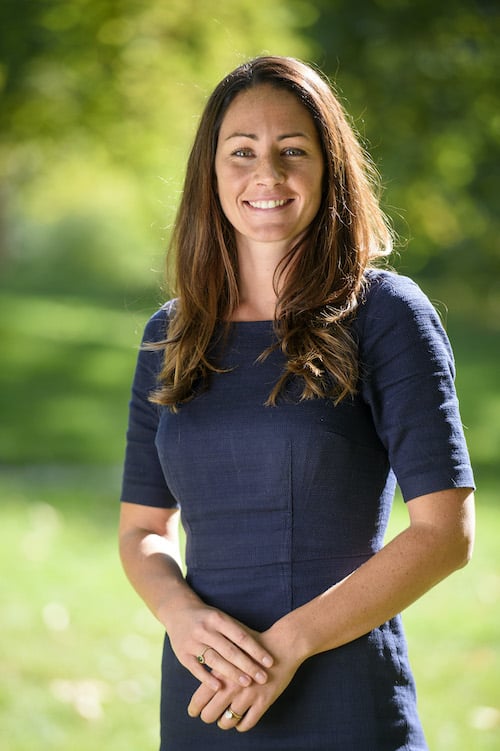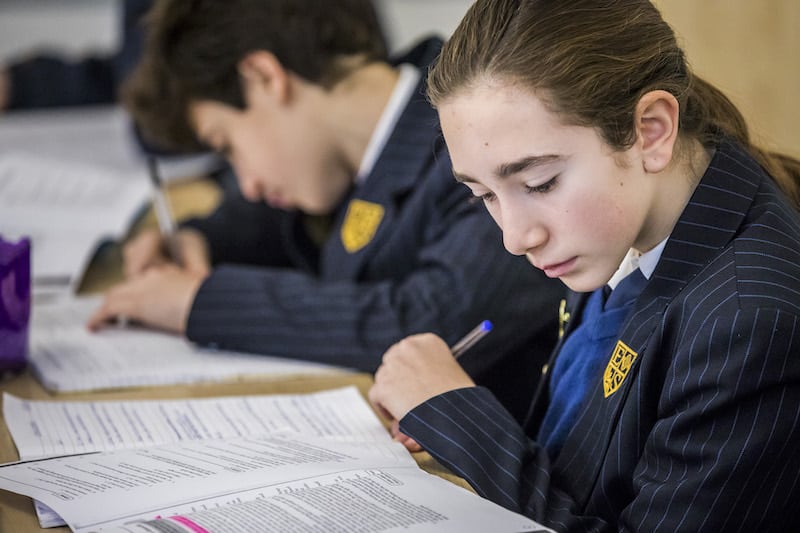Caroline Townshend, Head of Eaton Square Senior School, has some top tips to make sure GCSEs are a good experience
GCSE year is no ordinary year for secondary education students. Particularly with exams only returning to a semblance of normality post-Covid. And while exams are undeniably stressful, teenagers may also find this period of their education very fulfilling. Revision is challenging, but sitting exams gives GCSE students a chance to demonstrate their interest in a subject and receive recognition for their dedicated hard work.
And results day can be fantastic experience, offering young people a sense of validation that can help set them up for the next chapter in their lives with a spring in their step.

A period of transition that’s all about choice
Sitting GCSEs and receiving results also marks a period of transition, from secondary to further education. From here on, young people are expected to take more responsibility for their own educational choices and learning practices, which are all life skills that are first honed right from Year 9 when they select their GCSE options.
At Eaton Square Senior School, we appreciate the importance of these choices and offer our students 17 additional subjects to select from, in addition to the core GCSE subjects of English Literature/Language, Maths and Combined Science. Students are also free to choose whether to take the standard nine GCSEs or to choose one or two additional subjects, depending on each student’s abilities and requirements.
Typically, students study nine GCSEs but Eaton Square tailors these based on individual needs to ensure each student studies what is right for them
It’s these seemingly small freedoms that actually give our students a sense of autonomy over their own learning. Subjects are a chance for children to reflect upon their own interests and strengths and take a level of control over what they are going to be learning.
Supporting your child through GCSE exams
With relatively recent changes to GCSEs putting more focus on final exams and less on coursework, many children will be feeling tremendous pressure as they prepare for an intense period of revision and exams. Parental support can help hugely, however, both in terms of facilitating good study practices, and maintaining a good level of wellbeing and mental health throughout the entire process.
Help them to create a revision schedule
Setting up a revision plan at the beginning of the revision period is an important step. It sets the scene for good study practices and shows your child that they can, realistically, get through the work required in the timeframe they have available. Until it’s all set out for them in black and white, they may feel overwhelmed by the task at hand.
Factor in regular breaks and time off each day so that your child feels there is some levity in the schedule. Speak positively about revision and set realistic goals. Each time they achieve a goal, celebrate this to encourage them to stick to the schedule.
Encourage intrinsic motivation
Intrinsic motivation is all about WANTING to do something, rather than feeling that you are being made to do it by others. When a pupil takes a genuine interest in a subject or develops a growth mindset, they are more likely to experience intrinsic motivation and do well in their exams.
Helping your children to develop a genuine interest in a subject can involve visits to museums, galleries and historical sites, for example. Broadening their horizons through open discussions, exposure to the arts and through travel can help them to develop a sense of who they are and what they want out of life. These attributes will feed their intrinsic motivation and help them to study when it’s time to buckle down.


Give them space
Realise that the GCSE exams are not about you, they’re about your child – so stay calm. They, alone, will walk into the exam hall and sit the paper and the results impact their life, not yours. Appreciate the pressure they are feeling and give them the space to feel this without undermining their concerns.
Part of this is about respecting their space and how they want to study. Providing your child with a dedicated study area can help them to focus during revision and exam time. The space should be quiet and comfortable with a desk and chair. The goal is that your child can focus for periods of time through the day, as designated in their revision schedule.
Supporting your child’s wellbeing and mental health
There have been widespread reports, from teachers across the UK, claiming that pupils are showing particularly high levels of anxiety as they prepare to take their exams this year. After a two-year hiatus, and in light of the more general impact of the pandemic on children’s mental health, it’s not surprising that some are finding it difficult to cope with exam pressure – it’s a lot of pressure for any young person. Here are some practical tips on mental health support and boosting your child’s wellbeing.
Keep watch for signs of serious stress
Throughout the exam period and around results time, children can easily tip over into more concerning levels of stress. If your child is showing disinterest in their usual hobbies, is off their food or is extremely irritable, they could be experiencing severe anxiety. The same goes for physical symptoms. Headaches and stomach aches can be tell-tale signs. If you are concerned, don’t hesitate to speak to their teachers about these issues. They should be able to help.
Don’t motivate through fear
When you’re talking to your child about their exams or their GCSE results, avoid using fear as a motivational tool. Instead of warning them about what they could miss out on if they don’t do as well, speak to them about the opportunities they could enjoy if they get great results. Encourage them to do their best, rather than focusing on results and grades.

Help them to create healthy habits
A good night’s sleep and a healthy diet are both natural ways to lower cortisol and bring down stress levels. Encourage a sensible bedtime and a nightly cut-off time for revision. Keep the fridge stocked up with the right foods and make sure your child drinks lots of water. Treats will help to boost happy hormones too, so don’t forget to cook their favourite meal.
Know when to back off
Sometimes your child will want to talk about the pressure they feel, or about the exams themselves, and sometimes they will just want to be left alone. Don’t force communication when your child needs space. Respect their boundaries and offer support whenever they need it or ask for it.
In conclusion, there’s no place for negativity when it comes to exams. Children are supported by our in-house counsellor who is available two days each week and parents can help by offering positive encouragement. After an exam is over, what’s done is done and parents can play an important role in supporting children through whatever comes next.
You may also like...

























